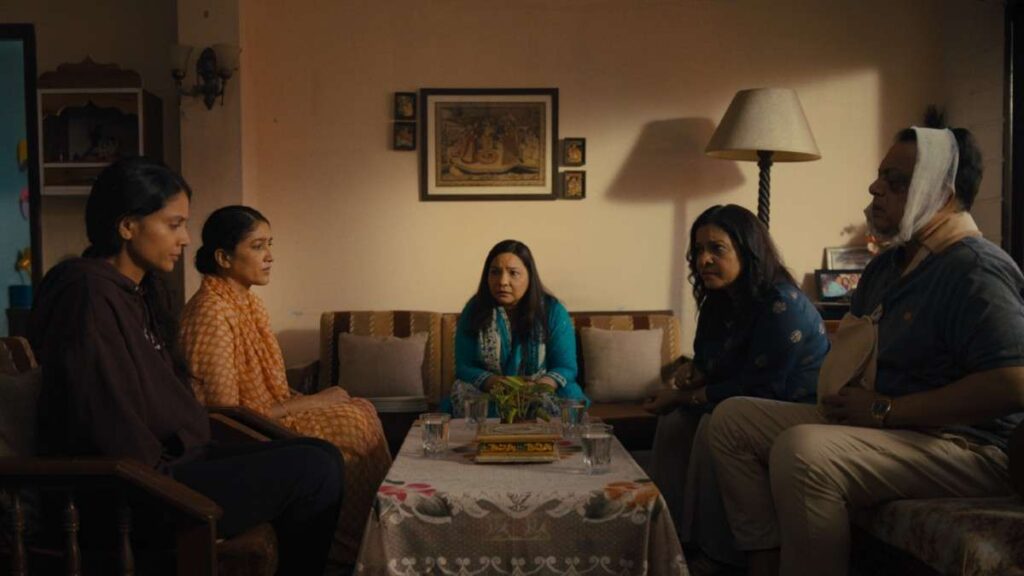Uttera Singh’s debut captures the unease of fitting in—at home, in culture, and in your own skin. Some films don’t need to shout to make their point. Pinch, which had its world premiere at Tribeca this year, is exactly that kind of film—understated, slow-burning, and gently unsettling. It isn’t driven by plot twists or dramatic monologues. Instead, it’s built on glances not returned, words left unsaid, and traditions that feel like tight collars.
The Everyday as Conflict
The film centers around Maitri, a 30-something Indian American woman who lives with her recently widowed mother in suburban America. Her days are quiet, her work life unremarkable, and her relationship with her mother is tense in that familiar, wordless way many adult children will recognize. Nothing is explicitly wrong, yet everything feels off.
That’s the genius of Pinch. It doesn’t force drama where it doesn’t belong. Instead, it finds discomfort in the day-to-day—the passive-aggressive reminders about prayers, the awkward temple visits, the stale rituals that feel more performative than spiritual. These are not explosive moments, but they sting. As the title suggests, it’s the small hurts that build up.
A Performance That Holds Back, and That’s the Point
Uttera Singh not only writes and directs but also plays the lead role. She gives Maitri a kind of emotional stiffness that’s frustrating at times, but also deeply real. There’s a whole life happening beneath her silences, and Singh trusts the audience to feel it without spelling things out.
Pallavi Sastry as the mother avoids caricature. There’s no melodramatic “why don’t you call me?” energy here. Instead, she plays grief with precision, tightly coiled, hidden under layers of ritual and routine. Together, Singh and Sastry make a believable, painful pair: two women grieving the same man but speaking completely different emotional languages.
Humor That Cuts Close to the Bone
What surprises you about Pinch is its sense of humor. It’s not a comedy, but it has moments that catch you off guard—a co-worker who confuses turmeric with some kind of magical cure-all, or a family friend who can’t help but overshare at a prayer meet. The laughs are subtle, but they serve a purpose. They ease the discomfort, only to remind you later why it was there in the first place.

No Grand Arcs, Just Small Shifts
There’s no big twist in Pinch. No third-act reveal. Instead, the film moves like real life does incrementally. You start to notice changes in posture, in the way characters look at each other, in the sentences they choose to say aloud versus the ones they hold back. The story doesn’t scream for resolution. It just shows you how people live with things they can’t name.
Visually, it’s unfussy. The house, the temple, the workplace—they all feel lived-in. The film doesn’t try to dazzle you with aesthetics. That might disappoint viewers expecting something more cinematic, but it’s in line with the film’s tone. This isn’t a story about spectacle. It’s a story about emotional residue.
Why It Resonates
What makes Pinch memorable isn’t that it’s groundbreaking—it’s that it’s deeply relatable, especially for viewers who straddle multiple cultures. It understands the space between generations, between mourning and moving on, between honoring tradition and resisting it. And it doesn’t pretend those tensions can be neatly solved.
There’s a particularly striking scene near the end—no spoilers—that captures this perfectly. It’s short, quiet, and without dialogue. But it lingers, the way certain memories do—not because they were loud, but because they hit somewhere personal.
Also Read….
Titan: The OceanGate Submersible Disaster; Why It’s No. 2 on Netflix’s Tudum List
Final Thoughts
Pinch is a confident debut that resists the pressure to over-explain. It asks its audience to sit with discomfort, to read between the lines, and to listen closely. For a film so rooted in the ordinary, it leaves an unexpectedly lasting mark.
If you’re looking for spectacle, this isn’t your film. But if you’ve ever found yourself stuck in the space between what your parents want for you and what you want for yourself, Pinch might feel a little too close to home. And that’s the point.
Writer – Subham Choudhary
